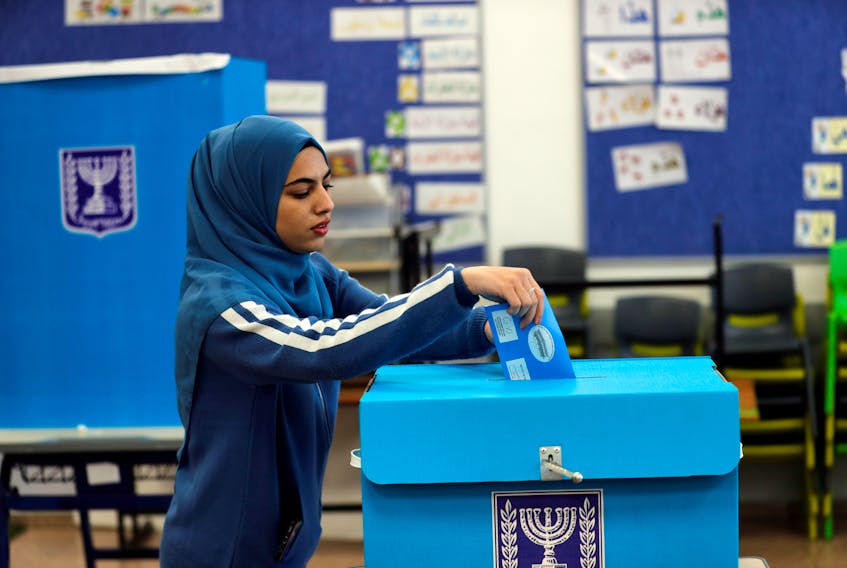Binyamin Netanyahu, or Bibi as everyone calls him, is the longest-serving prime minister in Israel’s history, and still in office although he has failed to win three elections in a row.
Last June, last September, and again early this month, Israeli voters split their votes in ways that made it almost impossible to put together a new government.

Bibi declared a victory, but he has already failed to form a coalition with a majority in the 120-member Knesset (parliament). He failed despite promising to annex all the Jewish settlements in the West Bank. Even the unstinting support of U.S. President Donald Trump, whose “vision” for a permanent peace settlement reads like a check-list of the territorial demands of the Israeli far right, didn’t do the trick.
The two-state solution – Jews and Arabs living peacefully side by side in separate sovereign states – has been dead for a long time, and Trump’s peace plan just drove a stake through its heart.
But the only alternative is the one-state solution, where the Arabs who are Israeli citizens and the considerably larger number who live in the occupied territories form a Palestinian near-majority within the expanded single state of Israel.
That Israel could be a democratic state where every citizen has an equal say or an apartheid state where most Arabs are subjects, not citizens, but it can’t be both.
The major obstacle to forming a majority coalition is the fact that Bibi goes on trial later this month on charges of bribery, fraud and breach of trust. Even if he is found guilty, he could technically stay in office until his last appeal is exhausted, a process that could take years.
This prospect is understandably unattractive to the leading opposition party, Benny Ganz’s Blue and White Party. Ganz will only consider a power-sharing left-right coalition with Bibi’s Likud party (which would command a majority) if Ganz gets to be prime minister for the first two years. Then Netanyahu could take his turn if he is absolved by the courts; otherwise not.
This deal is equally unattractive to Bibi: the safest place for him to be at the moment is in the prime minister’s office. Stalemate. A fourth election looms, because Bibi can go on calling them, and meanwhile the Israeli state drifts aimlessly: no legislation, not even a proper budget. What is to be done?
So a few days ago Benny Ganz broke the rules of Israeli politics by asking for the support of the Joint List, the umbrella organization of all of Israel’s Arab political parties.
The Joint List wouldn’t actually be in the coalition government, but the votes of its 15 Knesset members would put the Jewish opposition parties over the top and make Benny prime minister. Presumably they would expect some concessions in return, which alarms those Jewish Israelis who see their Arab fellow-citizens as traitors and potential terrorists, but talks between the parties started on Wednesday.
This ground-breaking deal may never be consummated – the odds are against it – but it is nevertheless a turning point. For the first time, the real Israel of today is showing through the cracks in its hidebound politics.
Five years ago President Reuven Rivlin – Ruvi to his friends – made a startling speech in which he pointed out that barely half the children now in Israeli primary schools will grow up to be Zionists. Right down to the end of the 20th century a large majority of the population was secular Zionists, mostly of Eastern European origin, and everybody else was “minorities,” but that time is gone.
Only 38 per cent of the children in primary school today are secular Zionists. Another 15 per cent are national-religious: observant Jews who nevertheless share the Zionist vision. But a quarter of the children are Haredim: ultra-Orthodox Jews who do not recognize the legitimacy of the Jewish state, regarding it as a rebellion against God – and another quarter are Arab and mostly Muslim.
Few people in the latter two groups will even serve in the army.
These four very different “tribes,” as Ruvi calls them, have to share Israel, like it or not. Moreover, the one-state Israel that implies, extending from the Jordan Valley to the Mediterranean, will have to include all the Arabs in the occupied territories as well. Learning to live together, given all the bitter history, may be well-nigh impossible, but there are no other options.
This certainly not a vision that Benny Ganz shares: his willingness to admit Israeli Arabs to the country’s coalition politics is grudging at best.
“This is not the government we wanted,” he said.
And yet, it might be the government that Israel needs.
Gwynne Dyer’s new book is “Growing Pains: The Future of Democracy (and Work).”









